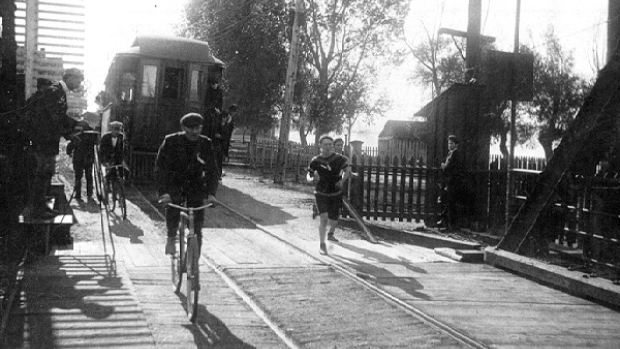Nov 10, 2016
Jimmy Duffy: Marathoner died for his adopted country
With Remembrance Day approaching, TSN’s Bob Weeks travelled to Belgium to visit the battlefields and cemeteries of the First World War to profile some of Canada’s top athletes of the day who made the ultimate sacrifice more than a century ago.
By Bob Weeks

YPRES, Belgium - On April 20, 1914, Jimmy Duffy was the first runner across the finish line at the Boston Marathon. A little more than a year later, he was buried in a grave in Vlamertinghe, Belgium.
Duffy’s story is one of great success and velour, of a man who was one of Canada’s best marathoners who died for his adopted country.
Born in Sligo, Ireland, Duffy and his family moved to Edinburgh, Scotland where his running career took off. In 1909 he won the Scottish junior cross-country title and a year later set a Scottish record for the five-mile run – 25:52.
Duffy was also a bon vivant who loved to make a wager, sip a pint and wink at a pretty girl. Reports of the day say it was this lifestyle that cost him a spot on the British Olympic team in 1908.
In 1911, Duffy immigrated to Canada, looking for prosperity and also to continue his running. He quickly established himself as one of the best marathoners of the day and, at a time when running was on the front pages of the sports section, Duffy also became a media darling, quick to offer a joke to reporters.
He captured races in New York and Toronto, and finished second in the famous Around the Bay Race in Hamilton, Ont., which that year served as the Olympic qualifier. Since he was the top Canadian in that run, he was named to the Canadian team that headed to Stockholm, Sweden.
At the Olympics, Duffy practised patience in the early going – something that had cost him races in the past – and was well back at the halfway mark. Gradually he moved up in the stifling heat and ended up finishing fifth, which still ranks as the best performance by a Canadian marathoner at the Games.
He returned home to Canada and continued his running, winning, among many races, the 1912 Around The Bay Race in 1:46:12, a record that stood for 46 years.
Two years later, he captured what is arguably his greatest achievement – the Boston Marathon. In what is still one of the closest finishes in the race’s history, Duffy and fellow Canadian Edouard Fabre changed leads four times over the last mile before Duffy accelerated and broke the tape in 2:25:01, just 15 seconds ahead of Fabre.
Although he almost collapsed at the finish, Duffy was still in decent enough shape to make two requests that exemplify the fun-loving guy he was: a pint of beer and a cigarette.
Not long after his Boston win, Duffy traded his running shoes for army boots, enlisting in the Canadian Expeditionary Force and joining the 16th Battalion of the Canadian infantry.
In April 1915, Duffy and his comrades found themselves near Ypres, Belgium. As the Canadians stood in reserve, the Germans opened the valves on tanks of chlorine gas, sending a wave of poison across the battlefield where French troops were in the front line.
Not prepared for this new type of warfare, the French broke ranks and left a six-kilometre gap through which the Germans could advance. The Canadians were called up quickly to plug this hole and counter-attack in what was known as Kitcheners’ Wood.
Duffy was part of that group and they raced towards the German line, suffering horrible casualties as they did. Of the 305 men in the 16th that jumped from the trenches, 278 died. Still, they stopped the Germans in one of the most important battles of the First World War.
In the book, The Great War As I Saw It by Canon Frederick Scott, Duffy’s final moments were described. Scott was walking on the battlefield in the dark when he saw something moving in the darkness.
“I called out, ‘Is anybody there?’ A voice replied: ‘Yes sir, there is a dying man here.’ I went over and there I found two stretcher-bearers beside a young fellow named Duffy, who was unconscious. He had been struck by a piece of shrapnel in the head and his brain was protruding.”
Duffy was carried off the battlefield but died in a field hospital on April 23. He was buried in the Vlamertinghe Military Cemetery just outside the centre of Ypres.
Just four days earlier back in Boston, Fabre crossed the finish line to win the Boston Marathon.


